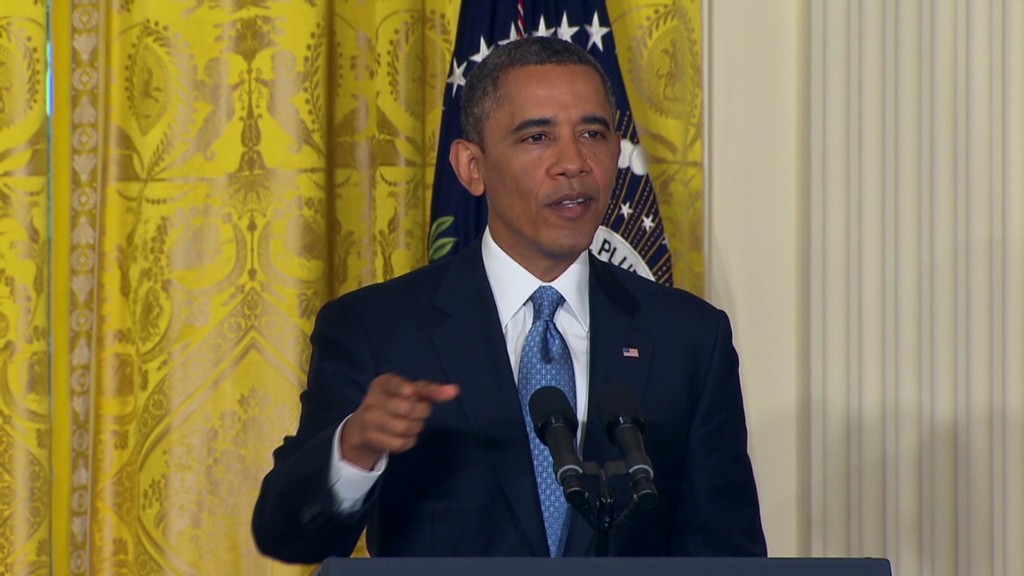
The Obama administration on Monday turned up the heat on Congress to raise the debt ceiling.
The Treasury Department, hours after President Obama again said he would not negotiate with Congress over the issue, said it will run out of ways to keep the country under the legal borrowing limit sometime between mid-February and early March.
U.S. borrowing officially hit its $16.394 trillion legal limit on Dec. 31. As a result, until the debt ceiling is raised, Treasury is not allowed to borrow new money to help it pay all the country's financial obligations.
Since the country operates with a deficit, Treasury on average takes in about $100 billion less in revenue every month than it has committed to pay out for everything from payments to federal contractors, Social Security checks to seniors, interest on the debt and salaries for federal workers.
To cover near-term borrowing needs, Treasury has begun using "extraordinary measures" to harvest $200 billion.
"If extraordinary measures were allowed to expire without an increase in borrowing authority, Treasury would be left to fund the government solely with the cash we have on hand on any given day," Treasury Secretary Tim Geithner said in a letter to congressional leaders.
Also on Monday, Obama in a press conference stressed that raising the debt ceiling is not a license to spend more money. Rather, he said, it would allow Treasury to pay financial obligations already authorized by lawmakers.
"America cannot afford another debate with this Congress about whether or not they should pay the bills they've already racked up. ... We are not a deadbeat nation."
House Republicans see the issue very differently. They have said they won't support a debt ceiling increase unless it is matched or exceeded by spending cuts.
"The consequences of failing to increase the debt ceiling are real, but so too are the consequences of allowing our spending problem to go unresolved," said House Speaker John Boehner in response to the president's comments.
What happens if debt ceiling isn't raised
If Congress fails to raise the U.S. debt ceiling before Treasury exhausts its extraordinary measures, the country would be entering uncharted territory.
So it's impossible to say exactly what would happen. But whether the impasse lasted a week or a month, many believe it would harm the economy.
Obama's prediction: "Social Security checks and veterans benefits will be delayed. We might not be able to pay our troops or honor our contracts with small business owners. Food inspectors, air traffic controllers, specialists who track down loose nuclear materials wouldn't get their pay checks."
For the month between Feb. 15 and March 15, the Bipartisan Policy Center estimated that Treasury would owe $452 billion in payments. But it would only take in about $277 billion in revenue.
Normally Treasury would cover that $175 billion cash shortfall by issuing more U.S. bonds and notes. But unless the debt ceiling is raised, a large amount of federal spending would have to be delayed indefinitely.
In fact, Treasury would be running a daily deficit every day during that period, the Bipartisan Policy Center estimates.
Most experts expect that the Treasury secretary would do whatever he must to ensure there's enough revenue to pay interest owed to bond investors.
But beyond that, it's not clear whether Treasury could prioritize most of the other 80 million payments it makes every month.
Related: Latest debt ceiling fix-it: IOUs
During the last debt ceiling standoff in 2011, "Treasury officials determined that there is no fair or sensible way to pick and choose among the many bills that come due every day," according to the Treasury inspector general.
The option that Treasury considered "least harmful" was to delay payments until it had sufficient revenue on hand to pay them.
Here's what that could like this time around.
Say Treasury starts facing cash shortfalls on Friday, Feb. 15, and the ceiling hasn't been raised. The bills due that day -- an estimated $52 billion -- wouldn't get paid until Feb. 22, by which point enough revenue had come in to cover them, according to Center estimates.
The $16 billion in payments due the next business day -- Tuesday, Feb. 19 -- wouldn't be paid until Feb. 25.
Those kinds of delays would snowball as Treasury came up against more days when large payments are due.


